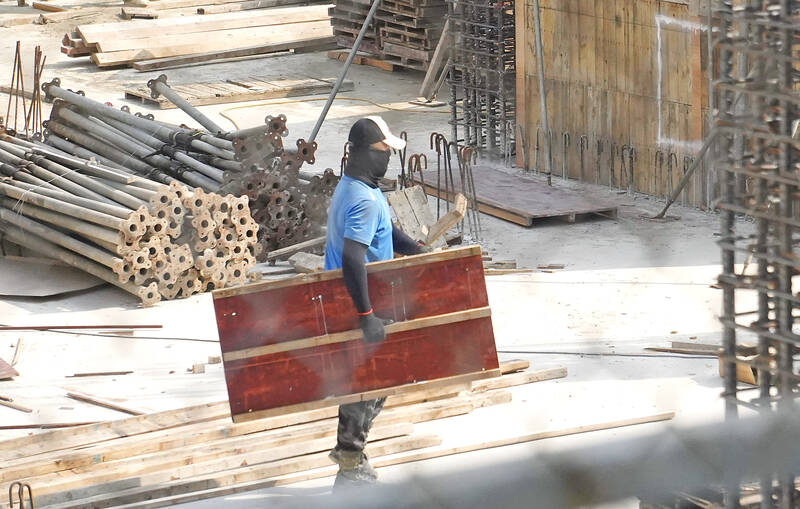Foreign contract workers employed in Taiwan’s manufacturing and construction sectors earned slightly less last year than in 2022, survey results released by the Ministry of Labor yesterday showed.
Migrant workers in the industrial sector had an average monthly income of NT$32,183 in June, down NT$120 or 0.4 percent from the same period in 2022, according to the survey, which is done once in the middle of the year.
The NT$32,183 figure was calculated based on a regular monthly salary of NT$27,284, up NT$1,218 or 4.7 percent from 2022, average overtime pay of NT$4,048, down NT$1,571 or 28 percent year-over-year, and an average irregular bonus of NT$851.

Photo: CNA
In June last year, the average number of working hours for industrial migrant workers fell 10.7 hours a month from a year earlier to 192.4 hours. Regular working hours averaged 167.4 hours and overtime hours averaged 25 hours, down 0.2 hours and 10.5 hours respectively, the ministry said.
Meanwhile, migrant workers serving as domestic caregivers had average monthly earnings of NT$22,638 in June last year, an increase of NT$2,105 from the same period in 2022, the survey found.
The figure was based on an average regular salary of NT$19,920 and average overtime pay of NT$2,291, which were up by NT$1,959 and NT$156 respectively from the previous year. It also included an average irregular bonus of NT$427.
Meanwhile, 86 percent of caregiver employers said they did not specifically set a number of hours their caregiver had to work per day, but regardless of whether there was a target, migrant caregivers worked about 10 hours per day on average.
Additionally, 60.6 percent of surveyed employers said their caregivers took days off during holidays or parts of holidays, the survey showed.
The survey found that 39.4 percent of caregivers chose not to take days off and that 95.1 percent of employers polled said they paid them for such overtime.
The ministry conducted the survey from July to August last year and obtained a total of 8,562 valid replies — 4,534 from companies in the manufacturing and construction sectors and 4,028 from employers of foreign caregivers.

The Coast Guard Administration (CGA) yesterday said it had deployed patrol vessels to expel a China Coast Guard ship and a Chinese fishing boat near Pratas Island (Dongsha Island, 東沙群島) in the South China Sea. The China Coast Guard vessel was 28 nautical miles (52km) northeast of Pratas at 6:15am on Thursday, approaching the island’s restricted waters, which extend 24 nautical miles from its shoreline, the CGA’s Dongsha-Nansha Branch said in a statement. The Tainan, a 2,000-tonne cutter, was deployed by the CGA to shadow the Chinese ship, which left the area at 2:39pm on Friday, the statement said. At 6:31pm on Friday,

The Chinese People’s Liberation Army Navy’s (PLAN) third aircraft carrier, the Fujian, would pose a steep challenge to Taiwan’s ability to defend itself against a full-scale invasion, a defense expert said yesterday. Institute of National Defense and Security Research analyst Chieh Chung (揭仲) made the comment hours after the PLAN confirmed the carrier recently passed through the Taiwan Strait to conduct “scientific research tests and training missions” in the South China Sea. China has two carriers in operation — the Liaoning and the Shandong — with the Fujian undergoing sea trials. Although the PLAN needs time to train the Fujian’s air wing and

Taiwanese celebrities Hank Chen (陳漢典) and Lulu Huang (黃路梓茵) announced yesterday that they are planning to marry. Huang announced and posted photos of their engagement to her social media pages yesterday morning, joking that the pair were not just doing marketing for a new show, but “really getting married.” “We’ve decided to spend all of our future happy and hilarious moments together,” she wrote. The announcement, which was later confirmed by the talent agency they share, appeared to come as a surprise even to those around them, with veteran TV host Jacky Wu (吳宗憲) saying he was “totally taken aback” by the news. Huang,

The American Institute in Taiwan (AIT) put Taiwan in danger, Ma Ying-jeou Foundation director Hsiao Hsu-tsen (蕭旭岑) said yesterday, hours after the de facto US embassy said that Beijing had misinterpreted World War II-era documents to isolate Taiwan. The AIT’s comments harmed the Republic of China’s (ROC) national interests and contradicted a part of the “six assurances” stipulating that the US would not change its official position on Taiwan’s sovereignty, Hsiao said. The “six assurances,” which were given by then-US president Ronald Reagan to Taiwan in 1982, say that Washington would not set a date for ending arm sales to Taiwan, consult